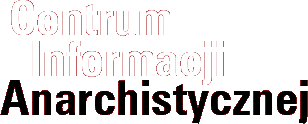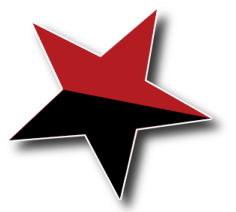Ukraina: Międzynarodowy Obóz Antygraniczny i Spotkanie FNB / Ukraine No Bomber Camp and FNB Meeting
Międzynarodowy Obóz Antygraniczny
International No Border Camp Aug.11-20
11 - 20 sierpnia na Ukrainii (koło Uzhgoroda)
(English text later)
Oprócz tematu antygranicznego na obozie odbędzie się międzynarodowe spotkanie Food not Bombs. (W Rosji istnieje 50 grup FNB.)
Planujemy wyjazd na obóz. Jeśli jest dość chętnych, możemy zorganizować autokar. Kontakt: fapraga@gmail.com
Wezwanie do uczestnictwa w obozie antygranicznym na Ukrainie 2007
Obóz będzie miał miejsce w dniach 10 - 20 sierpnia 2007 r. w głównym regionie tranzytu i migracji pracowniczych na Ukrainie: Transkarpatia (najbliższymi dużymi miastami są Uzhgorod i Mukachevo). Wielu uchodźców z Afganistanu, Uzbekistanu, Rosji (przede wszystkim Czeczenia) oraz niektórych innych krajów próbuje dostać się do Zachodniej Europy przez ten region. Wielu z nich jest wyłapywanych na granicy, umieszczanych w zamkniętych obozach, doportowanych, a nawet wydawanych władzy i poddawanych ekstradycji. Z drugiej strony przynajmniej połowa pracującej ludności Transkarpatii pracuje w zachodniej Europie, jako że jest to biedny i zacofany gospodarczo obszar.
W połowie 1990 roku pierwsze antygraniczne obozy miały miejsce w Niemczech przy polskiej granicy, nastepnie na poczatku 2000r. przy Polsko-Białoruskiej granicy. Teraz – nowy przenosi się na wschód : będzie to pierwszy antygraniczny obóz w byłym Związku Radzieckim na linii granicznej Twierdzy Europa. Region usytuowany jest w pobliżu zetknięcia się granic 5 państw – Ukrainy, Słowacji , Polski, Wegier i Rumunii. Cztery z tych państw należą dziś do Uni Europejskiej, ale Ukraina nie zostanie członkiem w bliskiej przyszłości. Dlatego też Twierdza Europy wzmocni swoje wschodnie granice z zachodnią Ukrainą.
Następną przyczyną dla której obóz będzie miał miejsce w tym rejonie jest koncentracja w nim obozów deportacyjnych. Trudno jest znaleźć jakiekolwiek “otwarte” informacje o nich. Formalnie wiele z obozów nie istanieje.
Sytuacja uchodźców na Ukrainie jest bardzo niestabilna : swoboda poruszania się jest ograniczona, dosyć trudno jest znaleźć prace oraz dostęp do bezpłatnego leczenia, nie ma socjalnych gwarancji. Jedyne wsparcie od państwa dla osób ze statusem uchodźcy to pojedyńcza wypłata wartośći 3 euro.
Kilka ważnych informacji dla osób które planują przybycie:
Ukraina zniosła reżim wizowy dla obywateli EU, the USA, oraz niektórych innych państw.
Bez konieczności posiadania wizy powinno być łatwo pojechać tam. Również polityczny klimat na Ukrainie nie jest tak zły, w porównaniu z wiekszością innych krajów byłego Związku Socjalistycznych Republik Radzieckich, oraz nawet wielu państw Uni Europeijskiej.
Niektóre z celów tego obozu to:
1) Stworzenie podłoża dla komunikacji pomiędzy aktywistami z Zachodniej i Wschodniej Europy oraz wszystkich innych części świata: spotkania, wymiana kontaktów, dzielenie umiejętności, wiedzy oraz doświadczeń itd. (warsztaty, dyskusje, treniengi praktyczne, koncerty i wiele więcej)
2) Aby zwrócić uwagę ludzi z Ukrainy (jak również z Rosji i świata) na rasistowską politykę migracyjną, aby skierować kwestię na współczesne formy rasizmu oraz ksenofobii.
3) Aby utworzyć kontakty z lokalnymi grupami regionu Transkarpatii: antyrasistowska edukacja, być może otwarte publiczne wydarzenia, pokazy filmów, wystawy, koncerty oraz dyskusje.
4) Dla wymiany informacji pomiędzy ruchem: jak władze w różnych państwach kryminalizują migrację, jakie są sytuacje w więzieniach deportacyjnych, oraz dla dzielenia się doświadczeniami ruchu oporu w różnych państwach. Jednym z poszczególnych rezultatów obozu ma być publikacja broszury z informacjami z różnych krajów - w sprawie tych wszystkich kwestii, aby wzmocnić nasza walkę.
5) Aby pozyskać więcej informacji z różnych antyrządowych społeczności oraz ruchów na Ukrainie, Rosji oraz w innych post-sowieckich krajach, zaangażowanych w związane z migracjami kwestie, mobilizacja ludzi do walki przeciwko rasizmowi, kryminalizacji migracji oraz przeciwko systemowi obozów deportacyjnych.
6) Aby wspomóc lokalne grupy oraz ruchy – Kijowska Grupa No Border, antyfaszystowski ruch w Rosji, Ukrainie, Białorusi, sieć Jedzenia Zamiast Bomb, itd.
Przede wszystkim będzie to obóz dla komunikacji, współpracy oraz planowania. Ale będzie również możliwość przeprowadzania akcji bezpośrednich.
Następnym wydarzeniem, które będzie miało miejsce na obozie jest międzynarodowe zebranie Food Not Bombs. Następuje eksplozja działalności Food Not Bombs we wschodniej Europie. W samej Rosji działa 50 grup, które regularnie robią akacje.
Rozpoczęliśmy już kształtowanie programu warsztatów, dyskusji, praktycznych treningów itd.
Ale wolimy, aby program obozu był sformułowany przez ludzi, którzy przyjadą.Tak więc, jeśli masz coś do podzielenia się lub chciałbyś się do czegoś przyczynić – proszę, powiadom nas teraz! Mogą to być różne zagadnienie interesujące ciebie, niekoniecznie główny temat obozu.
Proszę, weź pod uwagę, że Ukraina zniosła reżim wizowy dla obywateli EU, the USA, oraz niektórych innych państw, wiec jeśli posiadasz paszport któregoś z zachodnich krajów, prawdopodobnie nie potrzebujesz żadnej wizy, aby przybyć do nas.
Śmiało rozpowszechniaj to wezwanie poprzez własne kontakty.
Więcej informacji oraz kontakt: noborder2007@riseup.net
Międzynarodowa lista mailingowa: noborder_ee_int@lists.riseup.net
Tłumaczenie: Kuba KWK
The camp will take place from the 11th to the 20th of August 2007 in the main region of transit and labor migration in Ukraine:
Transcarpathia.
The eastward expansion of the European Union has resulted in moving the walls of "Fortress Europe" to the Western border of Ukraine. The Ukrainian region of Transcarpatia, of which the biggest cities are Uzhgorod and Mukachevo, has become a new borderline, with increasing
militarization and major concentration of detention camps for refugees from the countries of Global South and former USSR, who try to escape war, totalitarianism or misery to the European Union countries. It is hard to find any "open" information about the conditions in the majority of these camps.
The condition of the refugees in Ukraine is very unstable: freedom of movement is restricted; it is hard to get a job or medical care, and no social security is provided. When one gets refugee status, the only support they get from the state is a single payment of a petty 3 euros. In recent years Ukraine has even extradited asylum seekers to places like Uzbekistan, where they were imprisoned for years in the
notorious authoritarian regime's gulags.
The increase of border controls makes a big impact on lives of local people in the depressed region of Transcarpathia. The region is situated on the intersection of borders of five countries: Ukraine,
Slovakia, Poland, Hungary, and Romania. Four of them are now in the European Union, but Ukraine will not be its member in the near future.
So "Fortress Europe" strengthens its Eastern frontiers on the borderline of Western Ukraine. Still, up to half of the working population of Transcarpathia works abroad. Ukraine cancelled the visa regime for EU nationals, but the EU has not made the access of Ukrainians to the European labor market (or even European countries'
territory) any easier, although it would be hard to imagine for example agriculture in the EU today without Ukrainian guest workers.
At the same time, Transcarpathia has been for a long time a very special region with its unique blend of local cultures and traditions, and now it turned out to be one of the main routes for international
migration. Therefore, local border guards, security services and media, using xenophobic language, help to spread prejudices towards migrants among local population, which resulted in rising tensions in the region.
We demand the right of free movement for everyone, asylum for all the persecuted people and the right of people to migrate from depressed areas to work in other countries, if it can make their lives better.
We demand abolishing all visa regimes. We want to tear down "Fortress Europe" contemporary border regime, which has lead to the state-sanctioned murder of thousands of people in its borders during recent years. The "Global Apartheid" policy should be stopped!
We continue the tradition of No Border camps on Eastern borders of the Fortress Europe, which were organized 1998-2000 on the border of Germany and Poland, in 2000-2003 on the Eastern border of Poland, in
2001 in Slovenia, in 2003 in Romania, in 2003 and 2005 on the border between Greece and Bulgaria and in Finland in 2004. The camps have also been organized on the Southern borders of Europe (on Sicily 2000
and on Tarifa of Spain 2001), inside Europe at airports and main sites of European surveillance and decision-making system (such as in Strasbourg 2002), on the border between Mexico and USA and in
Australia. This year our international movement makes a major step forward, as the camp in Ukraine will be first ever organized on the territory of the former Soviet Union.
Some of the aims of this camp are:
1) To create a ground for communication between activists from Eastern and Western Europe and from everywhere else: meeting, establishing contacts, sharing skills, knowledge and experience, etc. (workshops,
discussions, practical trainings, concerts and much more).
2) To attract the attention of the people in Ukraine (but also in Russia and in the world) to the racist policy on migration; to address the questions of contemporary forms of racism and xenophobia.
3) To create contact with local people in the region of Transcarpathia: anti-racist education, open public events, film
screenings, exhibitions, concerts and discussions, with an aim to improve local people's attitude towards migrants, refugees and asylum seekers.
4) To exchange information between us: how the authorities in different countries criminalize migration, what are the situations with deportation prisons, and to share the experiences of resistance in different countries. One of the practical results of the camp is going to be the publication of a brochure with the information from different countries on all these issues to reinforce our struggle
(call-out with approximate questions is coming!).
5) To get more people from different anti-authoritarian collectives and movements in Ukraine, Russia and other 'post-soviet' countriesinvolved with the migration-related issues; mobilize people for
struggle against racism, criminalization of migration and deportation camps system.
We will discuss the possible ways and perhaps we will do some actions (but not in the very region of camp; it has been advised by everybody who's in touch with the region that any confrontational actions done by activists from "outside" on such a sensitive issue could make the situation worse, not better). So first of all it will not be an action camp but a camp for communication, networking, planning and popular education.
Another event that is going to take place in the camp is an International Food Not Bombs gathering. There is an explosion of Food Not Bombs activities in Eastern Europe. In Russia alone there are about 50 groups that are regularly doing actions. We already started to form a program of workshops, discussions, practical trainings etc.
But we prefer the program of the camp to be formed by the people who will come there. So if you've got something to share or contribute – please let us know now! It can be any topic you are interested in, not
only the main topic of the camp.
Please take into account that Ukraine has cancelled the visa regime for the citizens of the European Union, the USA and some other countries, so if you have a passport of some Western country you probably do not need any visa to join us.
Feel free to spread this call-out through your contacts.
More information and contact: noborder2007@riseup.net
International mailing list: noborder_ee_int@lists.riseup.net






